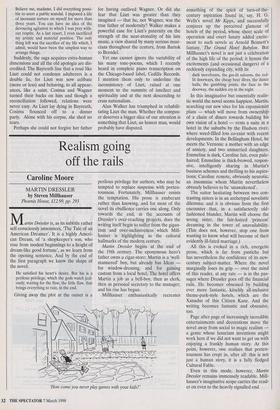Realism going off the rails
Caroline Moore
MARTIN DRESSLER by Steven Millhauser Phoenix House, £12.99, pp. 293 Martin Dressler is, as its subtitle rather self-consciously announces, 'The Tale of an American Dreamer'. It is a highly Ameri- can Dream, of 'a shopkeeper's son, who rose from modest beginnings to a height of dream-like good fortune', as we learn from the opening sentence. And by the end of the first paragraph we know the shape of the novel: He satisfied his heart's desire. But his is a perilous privilege, which the gods watch jeal- ously, waiting for the flaw, the little flaw, that brings everything to ruin, in the end.
Giving away the plot at the outset is a perilous privilege for authors, who may be tempted to replace suspense with porten- tousness. Fortunately, Millhauser resists the temptation. His prose is exuberant rather than knowing, and for most of the novel its ebullience carries one along. Only towards the end, in the accounts of Dressler's over-reaching projects, does the writing itself begin to suffer from the gigan- tism and over-inclusiveness which Mill- hauser is highlighting as the cultural hallmarks of the modern century.
Martin Dressler begins at the end of the 19th century. The eponymous hero's father owns a cigar-store; Martin is a 'well- mannered' boy, but already has Ideas for window-dressing, and for gaining custom from a local hotel. The hotel offers Martin a job as a bell-boy, then as clerk, then as personal secretary to the manager; and his rise has begun.
Millhauser enthusiastically recreates `How come you never play games with your kids?' something of the spirit of turn-of-the- century aspiration found in, say, H. G. Wells's novel Mr Kipps, and successfully conjures up the perceived glamour of hotels of the period, whose sheer scale of operation and overt luxury added excite- ment to such novels as Arnold Bennett's fantasy, The Grand Hotel Babylon. But Millhauser's novel is not just a celebration of the high life of the period; it hymns the excitements (and occasional dangers) of a recklessly expanding city, with its dark storefronts, the gas-lit saloons, the red- lit doorways, the cheap beer dives, the dance halls, the gambling joints, the face in the doorway, the sudden cry in the night.
In this imaginative but essentially realis- tic world the novel seems happiest. Martin, searching out new sites for his expansionist plans — which will move from ownership of a chain of diners towards building his own vision of a hotel — rents a suite in a hotel in the suburbs by the Hudson river, where weed-filled lots co-exist with recent developments. In the Bellingham Hotel, he meets the Vernons: a mother with an edge of anxiety, and two unmarried daughters. Emmeline is dark, Caroline fair, even pale- haired; Emmeline is thick-browed, respon- sive, intelligently sharing in Martin's business schemes and thrilling to his aspira- tions; Caroline remote, obviously neurotic, an insomniac whom Martin nevertheless obtusely believes to be `unawakened'.
The suitor hesitating between two con- trasting sisters is in an archetypal novelistic dilemma; and it is obvious from the first encounter that, in a satisfactorily old- fashioned blunder, Martin will choose the wrong sister, the fair-haired 'princess' dreaming in the tower of unavailability. (This does not, however, stop one from wanting to know what will become of their evidently ill-fated marriage.) All this is evoked in a rich, energetic prose, which is far from pastiche but has nevertheless the confidence of its new- century subject-matter. Where the novel marginally loses its grip — over the mind of this reader, at any rate — is in the pas- sages where Dressler goes off the financial rails. He becomes obsessed by building ever more fantastic, kitschly all-inclusive theme-park-style hotels, which are the Xanadus of this Citizen Kane. And the writing becomes fantastic and obsessive, too.
Page after page of increasingly incredible entertainments and decorations move the novel away from social to magic realism a genre whose luxuriant inventions might work here if we did not want to get on with enjoying a frankly human story. At this point; however, one realises that porten- tousness has crept in, after all: this is not just a human story, it is a fully fledged Cultural Fable.
Even in this mode, however, Martin Dressler remains immensely readable. Mill- hauser's imaginative scope carries the read- er on even to the heavily signalled end.


























































 Previous page
Previous page